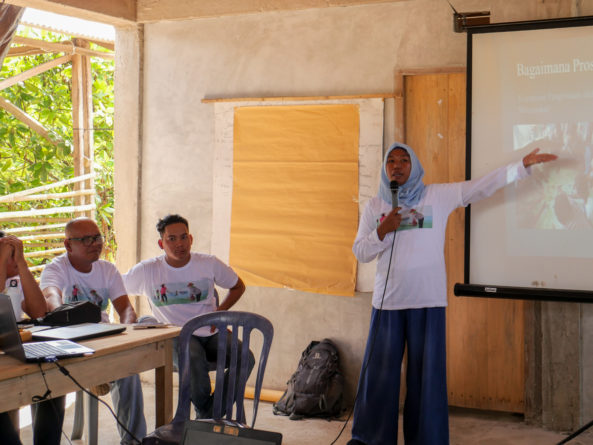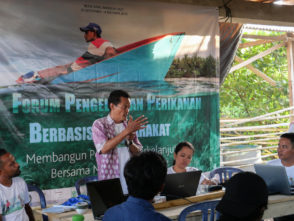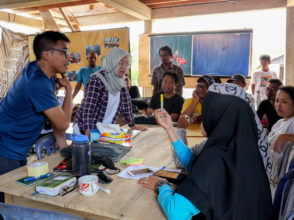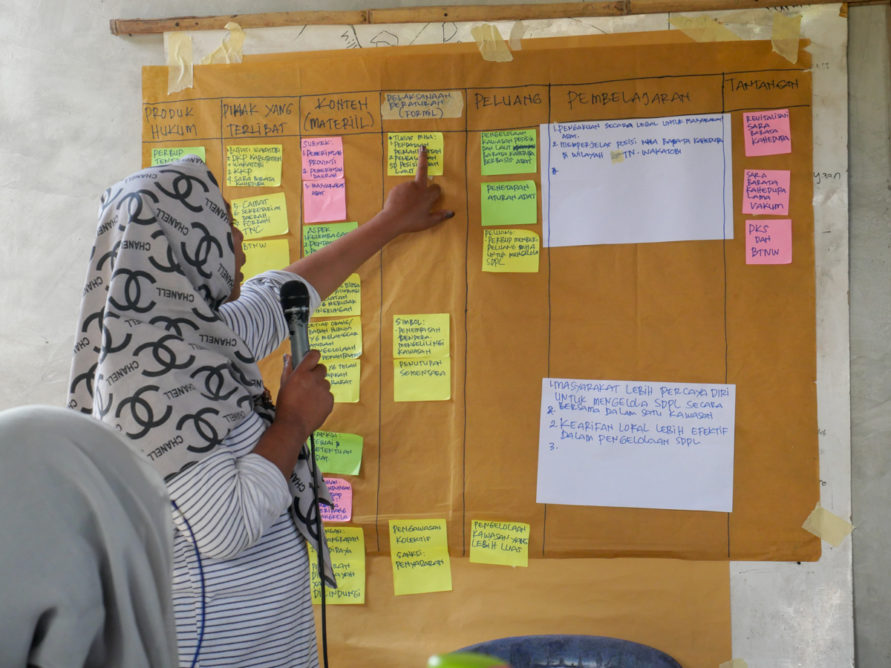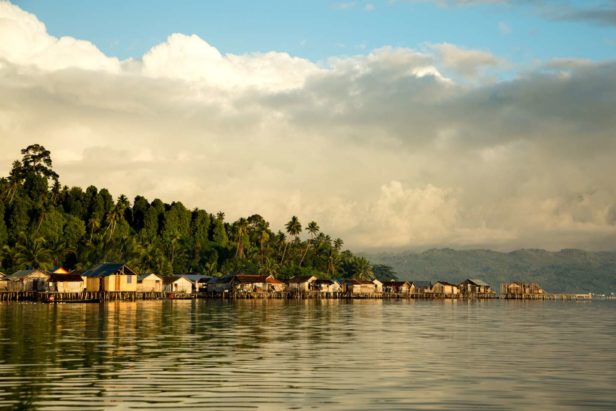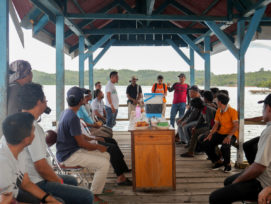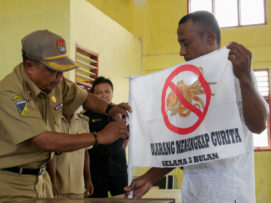It was early in the morning when we jumped into the clear water behind Neni’s homestay in Bone Baru Village, Central Sulawesi.
“Those are mullet,” said Nusi, gesturing to the transparent little fishes with yellow fins that we could see schooling in the shallows. “They’re still juvenile, the colour will change as they grow,” she added, as we finished our swim and began preparing for the start of the second Blue Ventures (BV) partner forum.
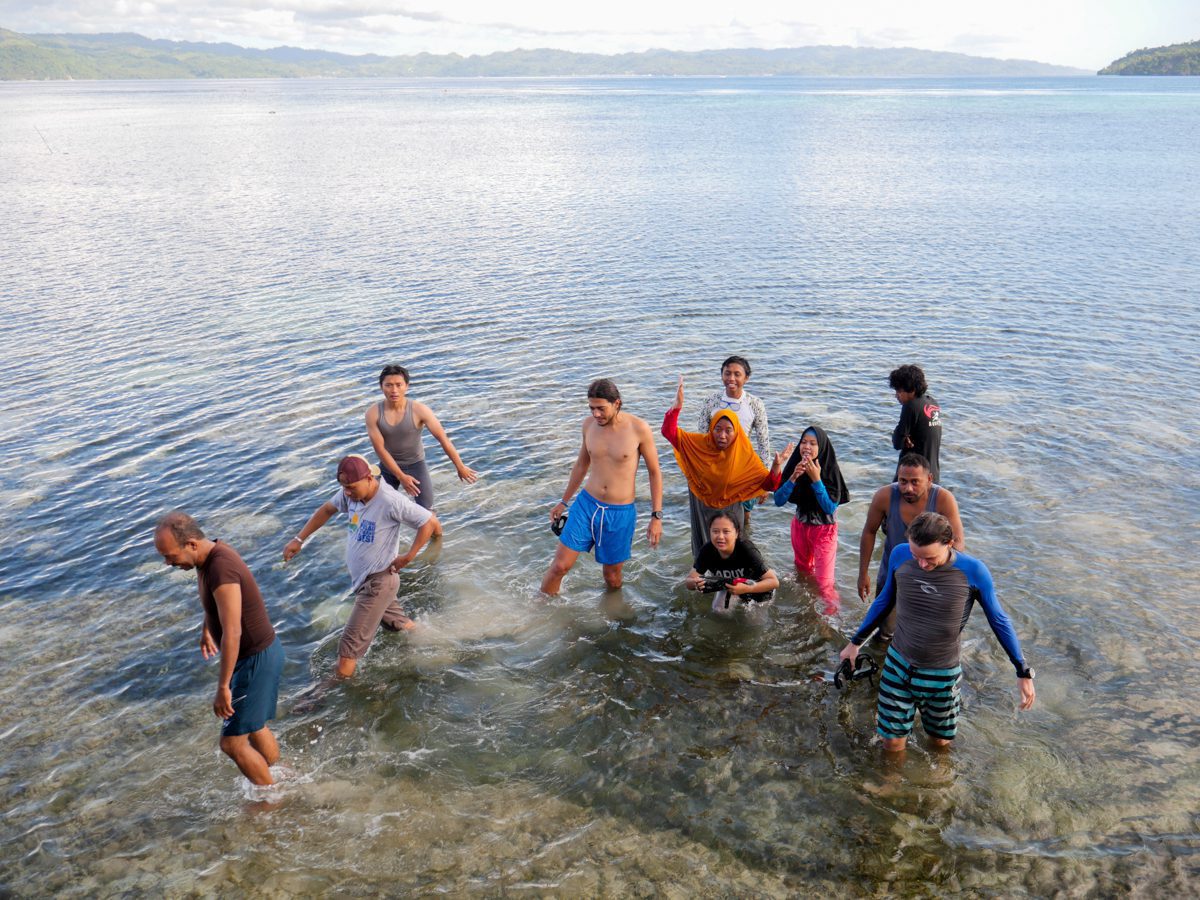
Swimming in Bone Baru | Photo: Nisa Syahidah
More on our partners
– In Wakatobi National Park, Southeast Sulawesi, Forkani, Foneb and Komanangi are supporting island communities to manage their local fisheries. Meanwhile in North Sulawesi, Yapeka is supporting community-led periodic octopus fishery closures in Minahasa Utara.
– In the Maluku islands, the indigenous community-based network Baileo is using customary approaches to improve communities’ welfare through sustainable resource management. Yayasan Planet Indonesia (YPI) is supporting local government and communities in West Kalimantan with conservation cooperatives that combine resource management with health and financial services.
– In East Nusa Tenggara, Yayasan Tananua Flores has begun working with coastal communities, having spent a decade supporting communities in the highlands with sustainable forest management. And finally, JARI has five programmes in Lombok on West Nusa Tenggara; research, conservation, education, ecotourism, and networking.
This four day partner forum, or “Forum Pengelolaan Perikanan Berbasis Masyarakat” (Community-based Fisheries Management Forum), was bringing together 25 people from 11 different organisations across Indonesia. Nusi for example was representing Forkani, a community-based NGO from Kaledupa, and Neni’s husband Saleh runs the organisation KALI here in Bone Baru.
A short while later, all the forum attendees were gathered in the village’s Aquaculture and Training Centre, where LINI, another one of BV’s partners, has been supporting community-led aquaculture and management of the beautiful Banggai cardinalfish.
Surrounded by impressive photos of LINI’s work supporting octopus fishery management, the forum opened with introductions from each organisation. This was a very useful experience for me, as it was my first field trip since I started for BV, and now I’ve been able to meet all of our partners in person, and learn about their work.
And what a diverse and inspiring group it is! Despite coming from across the country and including an array of different cultures, all of these organisations share BV’s mission of rebuilding fisheries with coastal communities.
“Two years ago, in the first partner forum, we only had Yapeka, Forkani, and LINI,” said Marc Fruitema, BV’s Outreach Regional Programmes Manager. “It’s amazing to see how the network has grown!”
The forum was structured around five main discussion topics: participatory fisheries monitoring; periodic fishery closures; broader coastal zone management planning; marine resource governance; and advancing the legal recognition of community-led management.
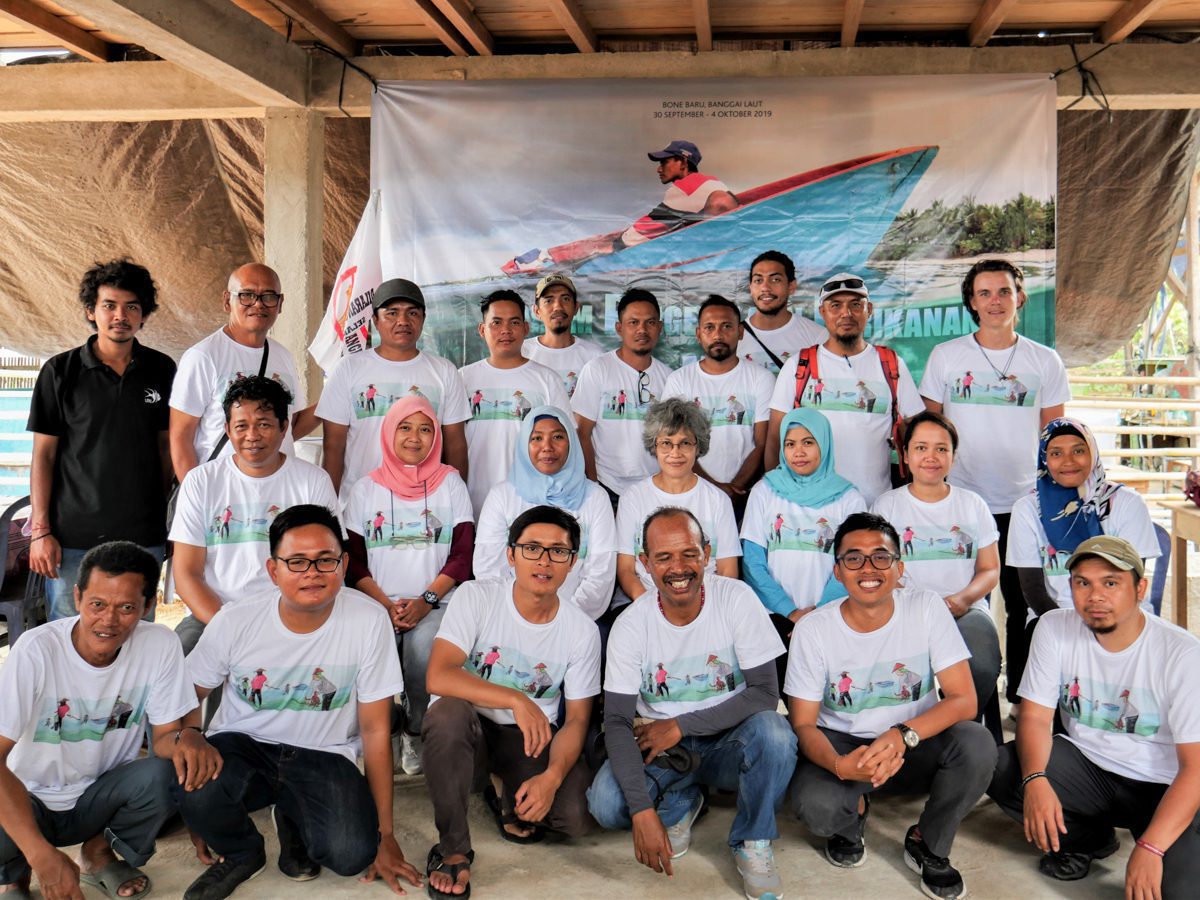
Blue Ventures partner forum 2019 | Photo: Nisa Syahidah
Win community hearts first
“In Darawa Village, we started with raising awareness, and then moved on to participatory monitoring, as the community were curious about their octopus resource,” said Nusi. “We told them that Forkani doesn’t need the data, it’s theirs to keep. They are the ones who will use and manage their resources, and ensure that their octopus fishery lasts for future generations. This inspired the community, and they soon began planning their first periodic fishery closure using the new data.” Nusi spoke from her heart, and with pride, as last year Darawa became the first village in Indonesia to declare a periodic octopus fishery closure.
It was a similar story with LINI and KALI. Neither of the organisations mentioned anything about ‘closures’ for a full year, as they were nervous about putting people off. “The idea to initiate a closure must come from the communities. We just provide the information and spark the discussion – that’s our role,” said Surya Risuana, LINI’s site coordinator. This approach has resulted in six villages within the Banggai Utara Regency uniting to temporarily close 246 hectares to octopus fishing in September this year!
“The idea to initiate a closure must come from the communities. We just provide the information and spark the discussion – that’s our role.”
We all agreed that community-led monitoring and management are effective first steps along the path to broader management, but we also recognised that this grassroots approach will need legal recognition in order to work on a larger scale in Indonesia. As Jefferson, Baileo’s Project Manager, said, “We can not only focus on grassroots movements, we also need to be heard at a national level so that the communities get rights and acknowledgement of their locally managed marine areas.”
The first step towards legal recognition and access rights is to develop a complete understanding of an area’s conservation status, including customary rules, natural resource exploitation, zoning plan status, and the opportunities, threats and challenges for conservation.
As Rayhan, BV’s small-scale fisheries technician, summarised, “once we have this deep understanding of a particular area, then we can determine the best strategy to strive for legal recognition of community-led management.”
The process of collating these data began in the forum, and each organisation identified what they needed to research further on their return home.
Work hand in hand – every stakeholder involved
But the forum wasn’t only talking with each other and arranging post-its on the wall. Broader management planning takes a lot of work, and involving all of the stakeholders is very important, so we spent some time over the following days of the forum visiting local government and meeting fishers.
At the Banggai Utara district office in Lokotoy Village, we witnessed local leaders officially sign a new resource management plan for the coastal areas and small islands in the North Banggai District, including periodic octopus fishery closures, no-take zones, and tourism and aquaculture areas. This signing ceremony ended with the head of the district tying a flag to a marking buoy that read: “Dilarang Menangkap Gurita Selama 3 Bulan,” meaning “It is forbidden to catch octopus here for three months.”
Our destination on the last day of the forum took my breath away as we approached. Set against a backdrop of tropical jungle, the colourful houses of Popisi village are raised on stilts over the Banda Sea. The community in Popisi are Bajo, the seafaring people of Southeast Asia.
Popisi was one of the communities that proposed last year’s periodic fishery closure, and they have since been discussing future steps. “We need to improve our control and monitoring during the next closure, and I think we also need to involve the surrounding communities, to ensure that every fisher in the area follows the rules,” said octopus fisher and collector Herdianto, as we chatted to him on the waterfront.
That night, back in Bone Baru, we were treated to a night of dero – a traditional communal dance where we all joined hands and moved in a circle. As we danced, mimicking the movements of octopus, I sensed a real connection between everyone present. I really feel that experiences like these are essential in forming strong partnerships, and will help us all work together for better community-based fisheries management.
This forum is where most of us finally put names to faces, and many of us were learning about each other’s experiences, best practices, successes, and challenges for the first time. That’s the power of a forum, it’s like connecting the dots: we put all of our scattered learnings together to make one bigger picture – and we all leave with a better understanding.
Read our latest blogs from Indonesia


